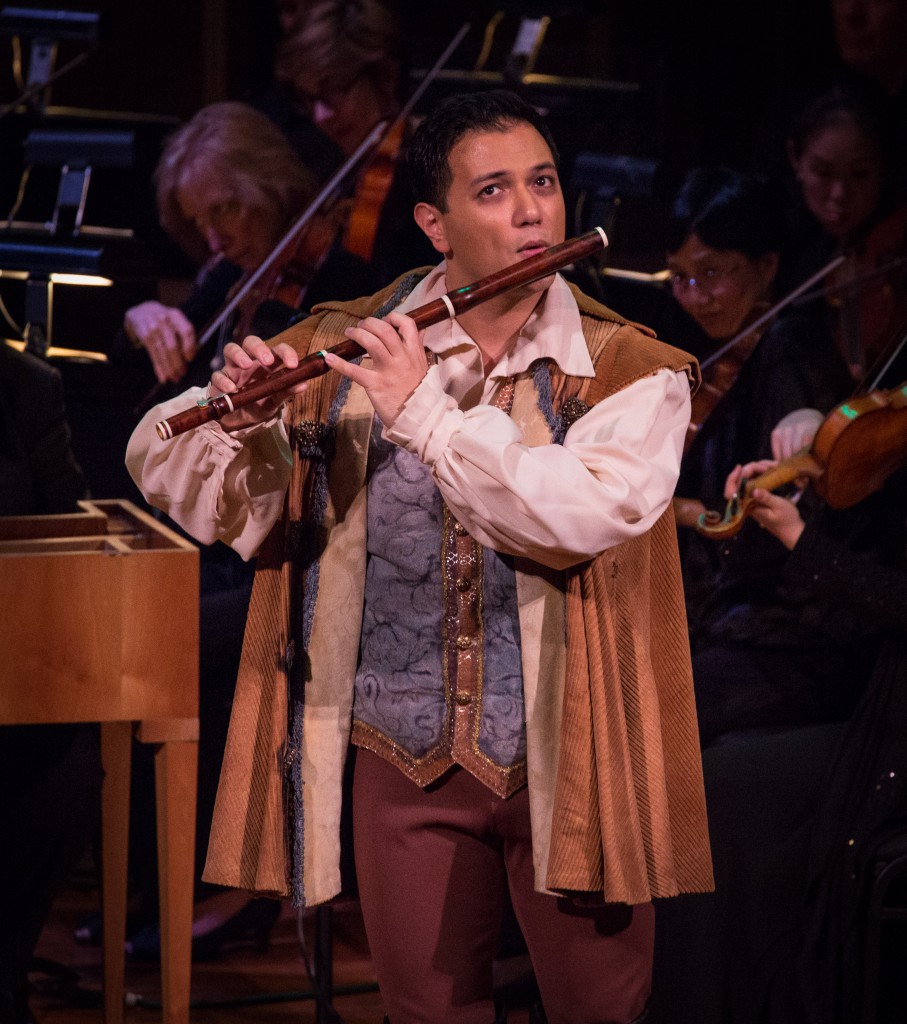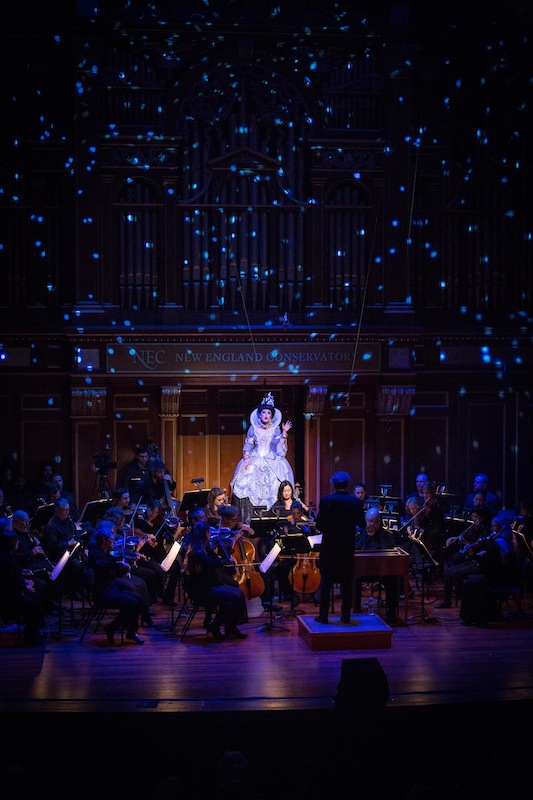Boston Baroque’s “Magic Flute” delivers Mozart with bells on

Nicholas Phan as Tamino in Boston Baroque’s performance of Mozart’s “The Magic Flute.” Photo: Kathy Wittman
The costumes were stock but the singing and playing were anything but off-the-rack in Boston Baroque’s period-instrument performance of The Magic Flute Friday night at New England Conservatory’s Jordan Hall.
Martin Pearlman, the ensemble’s founder and music director, led Mozart’s tuneful score in a suave rendering whose silvery strings and mellow winds seemed tailored to the intimate yet splendid hall.
The singing was eminently enjoyable from top to bottom of the cast list, from Nicholas Phan’s sturdy Tamino and Leah Partridge’s radiant Pamina to three ethereal boy singers as the Three Spirits who led the pair through their trials.
The semi-staged performance took place on the semi-stage that was created by squeezing the orchestra toward the back wall. A center entrance and platform upstage provided an impressive setting for the likes of Sarastro and the Queen of the Night.
Stage director Mark Streshinsky worked up some effective comic business and directed traffic well in the narrow space, no small feat considering the voluminous gowns and trailing capes sweeping back and forth.
And speaking of gowns, capes and such, the production’s sartorial splendor—not just Papageno’s bird-suit, but a spectacular Elizabethan number for the Queen, matching silver gowns and tiaras for the Three Ladies, and a black-and-gold Roman centurion outfit with feathered headdress for the chief slave Monostatos—sent one searching the program for a costume designer credit.
There was one, in small print toward the back of the book: A. T. Jones and Sons, the legendary (founded 1868) costume-rental operation in Baltimore. Considering that The Magic Flute is by far the most frequently performed of all operas, one wouldn’t be surprised if the Jones shop had one or more complete kits for this show at the ready. In any case, the costumes fit well on Friday and looked appropriately eclectic for this fantasy piece.
The fantasy atmosphere was established right away in the Overture, the period instruments giving a veiled sound to the slow introduction and a delightful transparency to Mozart’s imitative counterpoint in the allegro. Enthusiastic applause followed, which conductor Pearlman, perhaps more used to cantata applause etiquette than operatic, acknowledged only with a slight turn of the head instead of taking a moment to get the orchestra up. (Similarly, later on, the audience’s clamor for a curtain call after the Queen’s second aria went unanswered.)
As the drama got under way, the mix of spoken dialogue in English and singing in German posed no problem, although not everyone in this cast of strong singers was equally good at projecting speech, which is quite a different skill.
Stage director Streshinsky apparently left not just singing but acting choices to the individual performers, with mixed results.
As Tamino, tenor Nicholas Phan was steadfast and every inch a prince, phrasing sensitively in a voice that became well-adapted to the intimate space after some oversinging and spreading on top in his Act 1 aria.
Leah Partridge’s limpid soprano and poised presence reminded the listener that Pamina is not just the pretty love interest but the daughter of a queen—which is not to say her performance lacked anything in vivacity, or in pathos as, seemingly spurned by her lover, she contemplated ending it all with her mother’s dagger.
Andrew Garland’s Papageno was endlessly amusing as a regular guy who wished he could catch a wife as easily as he caught birds, and who would evidently rather have been down the street at the Red Sox game than here amid thunderclaps, scary pursuers, and trials by fire. The singer’s bluff baritone showed an unexpectedly lyrical side in the philosophical duet with Pamina, “Bei Männern, welche Liebe.”
As the Queen of the Night, soprano So Young Park put some vocal heft behind the twinkling high notes and lightning embellishments, which were neatly executed but could have used more emotional content from this perpetually aggrieved and raging character.
As Sarastro, the Queen’s nemesis and ultimately the opera’s healing presence, bass Gustav Andreassen offered plenty of power vocally, but a kind of diffident, surfer-dude stage presence. With his long blond hair and beard, Andreassen appeared a kind of benign, 1960s-style cult leader. His arias, one of them delivered sitting a little sideways on a couch with Pamina, came off more as hippie sayings than moral pronouncements.
There are limits to historically-accurate performance, and one of them applies to the “Moor” Monostatos, a black man depicted by the librettist Schikaneder in 1791 as a lascivious villain by virtue of his race. In Friday’s performance, tenor Owen McIntosh’s menacing “otherness” came not from blackface but from a pale, cadaverous makeup job and a crouching, sniveling manner that contradicted his centurion costume, giving him the air of an embarrassed teenage boy in a skirt. McIntosh’s nasal delivery at least fit the character, but his blurred role in the drama needed the attention of a director.
Soprano Sara Heaton’s vivacious Papagena proved worth waiting for, drolly teasing Papageno in her old-lady disguise and finally revealing her youthful, feathery self for their stuttering love duet during the opera’s last scene.
The opera’s two vocal threesomes were superb, each in its own way. The trio of Sonja Dutoit Tengblad, Mara Bonde, and Emily Marvosh as First, Second, and Third Ladies, their sound matched right down to the vibratos, glittered vocally and brought smiles whenever they appeared, especially in the opera’s first scene, as each attempted to outmaneuver the others and become the sole “caregiver” to the handsome, passed-out prince.
One was also grateful for every return of young singers Charlie Purdue, Dhruva Schlondorff, and Kevin Liao as the Three Spirits. Members of the children’s chorus Voices Boston, the three tuned up exquisitely with a smooth, otherworldly sound, and neatly executed some tricky chromatic counterpoint in their last scene.
Bass Dana Whiteside was such an imposing presence in his first appearance as the Speaker of the Temple that he might have been mistaken for Sarastro himself. He and tenor Stefan Reed were also effective as priests and men in armor announcing the trial.
A mixed chorus of 20 singers, later reduced to men-only for the sacred rituals, moved the drama along robustly.
Pearlman and the orchestra accompanied the action subtly but with verve and attention to interactions between singers and orchestral players. The understated (to modern ears) period-instrument sound allowed the singers to explore their parts without overstraining.
Mention must be made of two non-singing stars of the production. One was the magic flute itself, convincingly mimed by Phan as Tamino and mellifluously played by Christopher Krueger in the orchestra.
The other was the keyed glockenspiel, the voice of Papageno’s magic bells, a recently-made replica of the kind of instrument that would have been used in the opera’s first performances.
Made by Robin Jennings in England for a period-instrument production there of The Magic Flute—and therefore tuned to 18th-century pitch, A430 instead of the modern A440–this little box on legs emitted unearthly, flute-like bell tones clearly capable of enchanting one’s enemies and attracting wild animals, as happened in Friday’s performance. Peter Sykes wove the magic at the keyboard.
The Magic Flute will be repeated 7:30 p.m. Saturday. bostonbaroque.org; 617-987-8603.
Posted in Performances

Posted Apr 28, 2016 at 10:03 am by M K Terrell
A thoroughly enchanting evening–still can’t get the music out of my head two weeks later. Thanks to all.